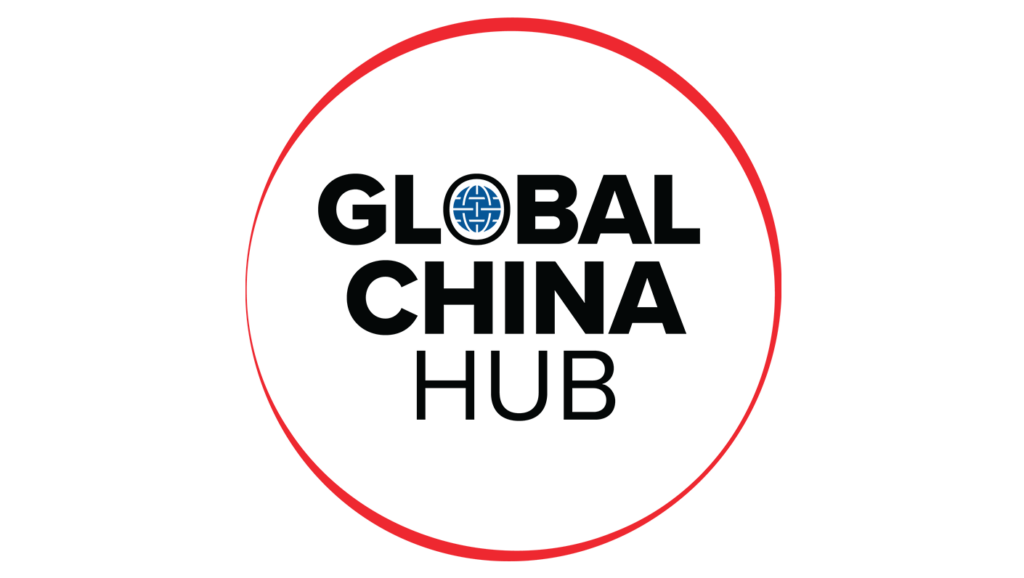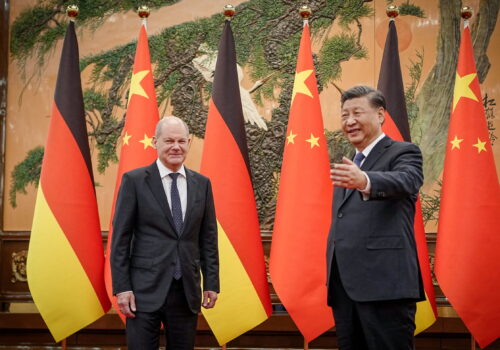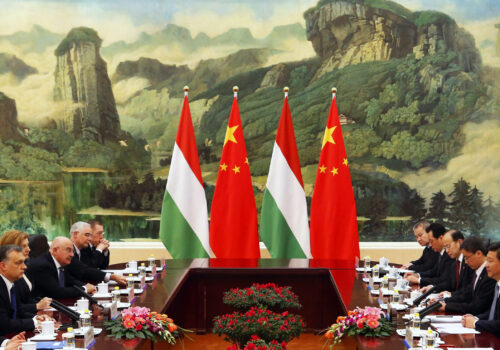France’s policy on China: Strategic autonomy and less naïveté
This is the fourth chapter of the report “Is Europe waking up to the China challenge? How geopolitics are reshaping EU and transatlantic strategy.” Read the full report here.
Over the past decade, France’s traditionally cooperative ties with China have evolved into a more complex and cautious relationship, as Paris increasingly shifts its policy toward balancing. This recalibration has been driven by France’s doctrine of strategic autonomy, its commitment to “de-risking” in response to Beijing’s distortionary industrial policies, and China’s growing influence in the Indo-Pacific. France initially benefited from booming trade with China—especially between 2005 and 2015, when exports of aerospace, luxury, and agri-food products flourished. In the recent past, however, China’s protectionist and state-driven policies have tilted the relationship sharply against France, eroding what was once a confident economic partnership.
In the technology domain, France’s policy embraces “de-risking, not decoupling,” tightening safeguards and investment screening for critical technologies, infrastructure, and data while preserving selective climate-related cooperation. This approach aligns with the EU’s economic-security agenda, prioritizing joint risk assessments for advanced semiconductors, artificial intelligence (AI), and quantum technologies. Meanwhile, France’s security posture toward China carefully balances engagement with cautious countermeasures, maintaining only limited alignment with the United States. Leveraging its permanent Indo-Pacific presence, France combines expanded naval operations and allied exercises with a structured military-to-military dialogue with Beijing, using inter-staff and theater-level contacts to manage risks, signal deterrence, and uphold the rules-based order. This approach underscores that dialogue complements—rather than undermines—its transatlantic and regional commitments.
France’s China policy and its approach to the EU’s policy on China illustrate a dual-track strategy: nationally, Paris balances engagement with safeguarding competitiveness, while at the EU level it supports de-risking and stronger balancing measures. Growing competitive pressures from China have prompted France to advocate for stricter EU policies on trade, investment screening, strategic technologies, and critical infrastructure.
Diplomatic relations with China have a long history. Paris established ties with the People’s Republic in 1964, following Europe’s lead. In 1973, President Georges Pompidou became the first Western European head of state to visit Beijing during the Cold War. Deng Xiaoping, then first vice premier, reciprocated in 1975 as the first Chinese leader to pay an official visit to a Western European country. In the 1980s, economic, technological, and cultural relations expanded rapidly, highlighted by President Valéry Giscard d’Estaing’s 1980 visit and the signing of multiple cooperation agreements, including in nuclear energy and other technological fields. During President Jacques Chirac’s visit in 1997, France became the first Western country to establish a comprehensive partnership with China.1Jinling Zhang, 60 Years of China-France Relations: Extraordinary Friendship and Exemplary Cooperation, (Beijing: Chinese People’s Institute of Foreign Affairs, 2024), https://www.cpifa.org/en/cms/book/402. In 2004, this agreement was upgraded to a comprehensive strategic partnership, with both countries vowing to work together on “strengthening the multilateral system for collective security” and “deepening bilateral cooperation on major international issues… [to establish] a safer and more stable international environment.”2“China, France Sign Joint Declaration,” Embassy of the People’s Republic of China in the United States of America, January 27, 2004, https://us.china-embassy.gov.cn/eng/zt/twwt/200401/t20040127_4912479.htm. During President Xi Jinping’s visit to France in 2014, marking the fiftieth anniversary of diplomatic relations, both sides expressed their intention to steer France-China relations toward “a new era of a close and lasting comprehensive strategic partnership.”3“Xi Says His State Visit to France Has Special Meaning,” Xinhua News Agency, March 28, 2024, https://www.chinadaily.com.cn/world/2014xivisiteu/2014-03/28/content_17387179.htm.
Lately, however, French policy has steadily shifted toward balancing and de-risking—a trend that accelerated with President Emmanuel Macron’s 2017 election. Macron set out to pursue a more realist policy on China and, in 2019, declared that “the period of European naivety is over” with regard to Chinese investments in the EU.4Kinling Lo, “EU Leaders Hold out Olive Branch to China over Belt and Road,” South China Morning Post, March 26, 2019, https://www.scmp.com/news/china/diplomacy/article/3003378/eu-leaders-hold-out-olive-branch-chinese-rival-hint-they-are. At the same time, Macron has sought to continue France’s legacy of open dialogue with China and cooperation on global issues, leveraging France’s historic role as an Indo-Pacific power. High-level diplomacy with Beijing has been sustained, avoiding unnecessarily confrontational language. Macron frames France as a “power of balances” (puissance d’équilibres), centering French and EU China policy around strategic autonomy and asserting independence from the United States.5Francois Godement, “France and China: Making the Best of an Unequal Relationship,” Institut Montaigne, May 7, 2024, https://www.institutmontaigne.org/en/expressions/france-and-china-making-best-unequal-relationship.
Efforts to strengthen the EU’s economic and technological resilience are central to Macron’s balancing agenda—and his advocacy of EU-level policies advanced by Ursula von der Leyen’s Commission has pushed ties onto a more confrontational trajectory.6Céline Pajon, John Seaman, and Marc Julienne, “France Adapts to an Era of Strategic Competition with China,” Institut Français Des Relations Internationales, May 6, 2024, https://www.ifri.org/en/external-articles/france-adapts-era-strategic-competition-china. At the same time, the tension between engagement and the structural push for de-risking has left allies and partners uncertain about the true direction of France’s China policy.7Ibid.
Trade and investment: From opportunity to strategic caution
France was an early beneficiary of China’s economic rise, enjoying a surge in exports from the 2000s—particularly between 2005 and 2015—when French aerospace, luxury, agri-food, and industrial goods found a receptive Chinese market. Recent years, however, have brought increasingly distortive Chinese economic practices—market barriers, state subsidies, and forced technology transfers—which have eroded earlier gains and shifted the balance against France. As a result, a once-optimistic commercial outlook in Paris has given way to frustration and strategic caution.
Over the six decades of France-China diplomatic relations, economic ties have deepened tremendously. Bilateral trade has grown eight hundredfold, from $100 million in 1964 to $81.2 billion in 2022. China is France’s fourth-largest trading partner, while France is China’s third-largest trading partner within the EU. China’s primary exports to France include energy components, boilers, electronics, furniture, prefabricated buildings, machinery, commodities, and vehicles.8Giulia Interesse, “France-China Relations: Trade, Investment, and Recent Developments,” China Briefing, May 15, 2024, https://www.china-briefing.com/news/france-china-relations-trade-investment-and-recent-developments. Moreover, consumer goods exports—including home appliances and toys—have grown by nearly 30 percent from 2023 to 2024.9“China, France to Advance Economic Exchanges with Deepening Cooperation in Emerging Fields amid 60 Years of Diplomatic Ties,” Global Times, May 5, 2024, https://www.globaltimes.cn/page/202405/1311668.shtml.
Meanwhile, France remains China’s largest source of agricultural imports within the EU. Pork, dairy, and wine dominate—but cosmetics, luxury goods, and medications are also in high demand. Bilateral trade is heavily imbalanced: Between 2022 and 2023, France’s trade deficit with China increased from €1.1 billion ($1.2 billion) to €2.92 billion ($3.14 billion).10Interesse, “France-China Relations.” Investment has also expanded. While 1,100 French companies operated in China in 2019, this number jumped to more than 2,000 by 2023, across sectors including industry, retail, agriculture, transport, financial services, and urban development.11“China, France to Advance Economic Exchanges”; “France and China,” Ministry for Europe and Foreign Affairs, March 2019, https://www.diplomatie.gouv.fr/en/country-files/china/france-and-china; Lu Chen and Kelly Wang, “From ‘French Farms to Chinese Tables’: France’s Economy Minister Touts Trade Potential,” Global Neighbours, April 8, 2025, https://www.globalneighbours.org/from-french-farms-to-chinese-tables-frances-economy-minister-touts-trade-potential.
While France’s bilateral trade and investment with China have been increasing, structural challenges have begun to weigh on economic ties. Paris has pressed Beijing to reduce the country’s massive trade surplus—framing rebalancing as the priority—and has expressed frustration that China fails to adhere to the rules of the international economic order.12“France and China.” President Macron has criticized China’s unfair trade practices and industrial overcapacity, calling them a global economic concern.13“Biden, Macron Seek Joint Response on China Trade after Tensions,” Bloomberg, June 8, 2024, https://www.bloomberg.com/news/articles/2024-06-08/biden-macron-seek-joint-response-on-china-trade-after-tensions. Similarly, Foreign Minister Jean-Noël Barrot has underscored the need for compliance with international trade rules, highlighting the risks posed by Chinese subsidies—particularly in the electric vehicle (EV) sector.14Necva Tastan Sevinc, “France Urges China to Respect Trade Rules, Warns against Supporting Russia,” Anadolu Ajansi, July 17, 2025, https://www.aa.com.tr/en/asia-pacific/france-urges-china-to-respect-trade-rules-warns-against-supporting-russia/3633744. Paris remains especially concerned that heavily subsidized EVs could threaten its domestic auto industry.15Marc Julienne, “Macron’s China Policy: Dropping Illusions and Bringing Back Realpolitik,” Prospect Foundation, May 14, 2024, https://www.pf.org.tw/en/pfen/33-10699.html.
This issue has also sparked the latest trade dispute between France and China. Responding to Chinese dumping of EVs on the EU market, the European Commission imposed tariffs on Chinese EV producers. China retaliated by imposing tariffs of almost 40 percent on European brandy imports, specifically targeting French cognac.16Finbarr Bermingham, “China Says EU Brandy Being Dumped on Local Market, but Holds Fire on Duties,” South China Morning Post, August 29, 2024, https://www.scmp.com/news/china/diplomacy/article/3276453/china-says-eu-brandy-being-dumped-local-market-wont-impose-duties-now. Macron called the move “pure retaliation.17“China Says It Is Working with France on Trade Differences, No Sign Yet of a Cognac Deal,” Reuters, June 7, 2025, https://www.asiaone.com/world/china-says-it-working-france-trade-differences-no-sign-yet-cognac-deal. The dispute was eventually settled after prolonged negotiations in July 2025, shortly before the EU-China Summit.18Xiaofei Xu, “Why France Is Toasting China’s New Tariff on European Brandy,” South China Morning Post, July 7, 2025, https://www.scmp.com/economy/china-economy/article/3317176/why-france-toasting-chinas-new-tariff-european-brandy.
Technology: Guarding critical sectors amid selective cooperation
France’s China policy in the technology domain combines “de-risking, not decoupling” with tighter safeguards on critical technologies, infrastructure, and data—while preserving selective cooperation in climate-relevant sectors.19Michel Rose and Laurie Chen, “Ahead of Xi Meeting, Macron Warns against Shunning China,” Reuters, April 5, 2023, https://www.reuters.com/world/europe/between-reset-de-risk-eu-leaders-pay-rare-visit-china-2023-04-04. Paris has strengthened inbound investment screening, permanently lowering the voting rights threshold for listed firms to 10 percent and expanding its scope to include low-carbon energy (including nuclear), photonics, and critical raw materials.20Pascal Bine and Wesley Lainé, “France Strengthens Foreign Investment Controls, Expands Jurisdiction to ‘Commercial Establishments’ Registered in France,” Skadden, Arps, Slate, Meagher & Flom LLP, January 16, 2024, https://www.skadden.com/insights/publications/2024/01/france-strengthens-foreign-investment-control; “Foreign Investment Screening in France—Annual Report 2023,” Ministère de l’Économie, des Finances et de la Souveraineté Industrielle et Numérique, 2023. https://www.tresor.economie.gouv.fr/Articles/c7ec36f3-6df0-4cf8-82aa-9c772917afeb/files/83865cf0-0ecd-4684-badf-3e39fa6bb833. These measures align with the EU economic-security agenda, prioritizing collective risk assessments for advanced semiconductors, AI, and quantum technologies.21“Commission Recommends Carrying out Risk Assessments on Four Critical Technology Areas: Advanced Semiconductors, Artificial Intelligence, Quantum, Biotechnologies,” European Commission, press release, October 3, 2023, https://defence-industry-space.ec.europa.eu/commission-recommends-carrying-out-risk-assessments-four-critical-technology-areas-advanced-2023-10-03_en.
In telecommunications, France applies a case-by-case authorization regime under the 2019 5G law. While not a blanket ban, time-limited licenses for high-risk vendors—primarily Chinese firms like Huawei and ZTE—will effectively phase them out by 2028.22LOI N° 2019-810 Du 1er Août 2019 Visant à Préserver Les Intérêts de La Défense et de La Sécurité Nationale de La France Dans Le Cadre de l’exploitation Des Réseaux Radioélectriques Mobiles (1) (2019) https://www.legifrance.gouv.fr/jorf/id/JORFTEXT000038864094; Mathieu Rosemain and Gwénaëlle Barzic, “Exclusive: French Limits on Huawei 5G Equipment Amount to de Facto Ban by 2028,” Reuters, July 22, 2020, https://www.reuters.com/article/technology/exclusive-french-limits-on-huawei-5g-equipment-amount-to-de-facto-ban-by-2028-idUSKCN24N26R. Industrial policy has also been recalibrated: the so-called ecological bonus (bonus écologique)—a state subsidy for buying or leasing a new or used electric or hydrogen vehicle—now uses an environmental score that effectively excludes most Chinese EVs. France has also supported EU trade defense actions against Chinese EVs.23“Ecological Bonus: Which New Vehicles Are Eligible?” Service Public, February 9, 2024, https://www.service-public.fr/particuliers/actualites/A17002?lang=en; “France’s Le Maire Welcomes EU Action against Chinese-Made Electric Cars,” Reuters, September 13, 2023, https://www.reuters.com/article/business/frances-le-maire-welcomes-eu-action-against-chinese-made-electric-cars-idUSS8N3A306F.
Research security bodies—including the General Directorate for Internal Security and the Secretariat-General for National Defence and Security—have issued guidance and alerts to reduce technology leakage and undue influence in academia and research and development.24“Conseils aux Entreprises : Flash Ingérence,” Direction Générale de la Sécurité Intérieure, last visited September 14, 2025, https://www.dgsi.interieur.gouv.fr/dgsi-a-vos-cotes/contre-espionnage/conseils-aux-entreprises-flash-ingerence; “Protéger le Débat Public Contre les Ingérences Numériques Étrangères,” Secrétariat Général de la Défense et de la Sécurité Nationale, November 23, 2022, http://www.sgdsn.gouv.fr/nos-missions/proteger/proteger-le-debat-public-contre-les-ingerences-numeriques-etrangeres. At the same time, civil nuclear cooperation endures: Électricité de France (EDF) and China General Nuclear Power Group cooperate at the Taishan Nuclear Power Plant, in which EDF holds a 30 percent stake—and France and China renewed and deepened their nuclear cooperation in 2023 and 2024.25“China, France Expand Nuclear Cooperation,” World Nuclear News, April 11, 2023, https://world-nuclear-news.org/articles/china,-france-expand-nuclear-cooperation; “French and Chinese Firms Ink Deals on Sidelines of Xi’s Paris Visit,” Reuters, May 6, 2024, https://www.reuters.com/markets/french-chinese-firms-ink-deals-sidelines-xis-paris-visit-2024-05-06.
Security: Dialogue without dependence
France’s security policy toward China reflects a carefully calibrated equilibrium. It combines strategic autonomy with a measured mix of engagement and balancing, while maintaining only limited alignment with the United States. As French officials noted in interviews for this report, Paris is willing to adopt a firm stance toward China—but on its own terms, not as a result of US pressure.
France’s historical identity as an Indo-Pacific power plays a central role in its security relations with China. On the one hand, Paris envisions an Indo-Pacific that is open, secure, and inclusive—grounded in respect for multilateral cooperation, international law, and sovereignty.26“France’s Indo-Pacific Strategy 2025,” Ministry for Europe and Foreign Affairs, July 2025, https://www.diplomatie.gouv.fr/IMG/pdf/france_s_indo-pacific_strategy_2025_cle04bb17.pdf. On the other hand, its emphasis on maintaining dialogue with China reflects a reluctance to engage in what it views as unnecessary confrontation.27Pajon, et al., “France Adapts to an Era of Strategic Competition with China.” The French government keeps communication channels with China open both to manage coexistence in the Indo-Pacific and because of China’s influence in the Global South, where France maintains an extensive network of relationships with its former colonies. France also seeks to maintain dialogue with China because the two countries share responsibility for international peace and security as permanent members of the UN Security Council and nuclear-armed states.
The Indo-Pacific features so prominently in French security policy that France was the first EU member state to adopt an Indo-Pacific strategy in 2018. Revised in 2025, the strategy rests on the premise that the Indo-Pacific is “a region vital to global prosperity,” yet increasingly tense due to “rivalries between great powers, China’s growing assertiveness, and strong trade tensions.” It maintains that France “is uniquely positioned in the region” as both “a European and Indo-Pacific nation.” The strategy’s four key priorities are:
- Strengthening the central role of France’s overseas departments, regions and communities;
- Consolidating sovereignty partnerships with Indo-Pacific countries;
- Supporting multilateralism and the development of regional organizations; and
- Contributing actively to the implementation of the EU Strategy for Cooperation in the Indo-Pacific.28“France’s Indo-Pacific Strategy 2025”; “The Indo-Pacific: A Priority for France,” Ministère de l’Europe et des Affaires Étrangères, July 2025, https://www.diplomatie.gouv.fr/en/country-files/regional-strategies/indo-pacific/the-indo-pacific-a-priority-for-france/; “EU Indo-Pacific Strategy,” European External Action Service, November 6, 2024, https://www.eeas.europa.eu/eu-indo-pacific-strategy-topic_en.
In the military domain, France sustains a structured yet pragmatic dialogue with China—enabled by its permanent naval presence in the Indo-Pacific. Regular inter-staff consultations, defense-ministry meetings, and communications between theater commands facilitate exchanges on counter-proliferation, dual-use goods, the Ukraine war, and regional security flashpoints such as the South China Sea and Taiwan. Simultaneously, Paris seeks to reassure its transatlantic and Indo-Pacific partners that its dialogue with Beijing is intended to enhance mutual understanding of China’s strategic intentions, not to undermine alliance unity. France frames its military engagement with China as complementary to its broader regional commitments, reflected in multilateral formats such as Track 1.5 dialogues and joint naval task forces (for example, with Japan and the Philippines).
In recent years, France has expanded its naval presence in the Indo-Pacific in line with its Indo-Pacific Strategy and in response to China’s increasingly assertive regional posture. French deployments have included multiple frigate transits through contested waters, freedom-of-navigation operations in the South China Sea, and the Charles de Gaulle carrier strike group’s 2024-2025 Pacific deployment. These operations underscore France’s commitment to the rules-based maritime order and its intent to signal deterrence while avoiding escalation. In this context, maintaining direct military-to-military communication with Beijing has become a vital component of Paris’s risk-management and regional-stabilization strategy.29“Annual Report 2024,” French Ministry of the Armed Forces, June 4, 2024, https://www.defense.gouv.fr/sites/default/files/dgris/DGRIS%20annual%20report%202024.pdf; Dzirhan Mahadzir, “French Carrier Charles de Gaulle Wraps First Pacific Deployment,” USNI News, March 7, 2025, https://news.usni.org/2025/03/07/french-carrier-charles-de-gaulle-wraps-first-pacific-deployment.
Russia’s 2022 invasion of Ukraine—and China’s material and diplomatic support for Moscow—have become key drivers in the hardening of Paris’s China policy. For years, French governments believed that Beijing’s “no limits” partnership gave Xi sufficient leverage to act as a potential mediator with Putin.30Pajon, et al., “France Adapts to an Era of Strategic Competition with China.” President Macron repeatedly urged China to curb its support for Russia, use its influence to advance a settlement, and restrain North Korean involvement—warning that continued assistance or escalation could trigger broader allied responses beyond Europe.31Marc Julienne, “France’s Emmanuel Macron to Press Xi Jinping on China’s Support of Russia,” Institut Français Des Relations Internationales, May 4, 2023, https://www.ifri.org/en/media-external-article/frances-emmanuel-macron-press-xi-jinping-chinas-support-russia; Shane Croucher, “Macron Wants Bigger Ukraine Role for China,” Newsweek, March 27, 2025, https://www.newsweek.com/macron-wants-chinas-xi-do-more-russia-ukraine-war-2051421; Laura Kayali, “Macron to China: Keep North Korea out of Ukraine War or Risk NATO Coming to Asia,” Politico, May 30, 2025, https://www.politico.eu/article/macron-china-keep-north-korea-out-ukraine-nato-to-asia; Rory O’Neill, “China Slams Macron over ‘Unacceptable’ Comments on Taiwan and Ukraine,” Politico, May 31, 2025, https://www.politico.eu/article/macron-ukraine-taiwan-china-war-israel-gaza-shangri-la. Successive Macron cabinets have stressed to Beijing that Russia’s war constitutes a direct assault on Europe’s security and that any actor aiding Moscow represents a grave threat to the European Union.32Sevinc, “France Urges China to Respect Trade Rules, Warns against Supporting Russia.”
France’s alignment with the EU’s China policy
France’s China policy—and its approach to the EU’s broader China strategy—illustrate the interaction of EU-level and national policymaking. While France’s national policy seeks to balance engagement with the protection of its economic competitiveness, its stance within the EU strongly supports de-risking and strategic balancing toward China. Rising economic and competitiveness challenges have reinforced France’s backing for the EU’s approach and prompted Paris to press for tougher measures in trade, investment, technology, and critical infrastructure.
In trade, Paris has firmly shifted toward strengthening Europe’s resilience and economic sovereignty, supporting a more assertive EU trade policy within a wider economic-security framework.33Pajon, et al., “France Adapts to an Era of Strategic Competition with China.” Reflecting this stance, Macron has argued that the EU’s exceptionally open market must be paired with credible defenses of European interests.34Sarah White, et al., “EU and France Press Xi for More Balanced Chinese Trade Ties,” Financial Times, May 6, 2024, https://www.ft.com/content/0728c778-4d5a-4dfc-8694-9c493e82df15. In 2023, France spearheaded a coordinated effort that helped prompt the European Commission to open anti-dumping investigations into subsidized Chinese EV makers.35Barbara Moens, et al., “France Puts Screws on EU Chief to Hit Back against Chinese Electric Vehicles,” Politico, September 11, 2023, https://www.politico.eu/article/france-breton-eu-chief-hit-back-against-chinese-electric-vehicles.
In investment, France has led efforts to reduce the EU’s strategic dependence on China and strengthen Europe’s economic autonomy and resilience. Paris has advocated reforming EU competition regulations to grant member states greater leeway to mobilize public investment, while promoting a strong industrial policy aimed at enhancing EU competitiveness in key strategic technologies.36Pajon, et al., “France Adapts to an Era of Strategic Competition with China.” Regarding Chinese investment in Europe, Macron—ahead of Xi Jinping’s state visit in March 2019—famously declared that “the period of European naivety is over,” emphasizing that “letting Chinese companies buy up EU infrastructure such as ports had been a ‘strategic error.’”37Kinling Lo, “EU Leaders Hold out Olive Branch to Chinese ‘Rival’ over Belt and Road,” South China Morning Post, March 26, 2019, https://www.scmp.com/news/china/diplomacy/article/3003378/eu-leaders-hold-out-olive-branch-chinese-rival-hint-they-are.
Regarding technology, Paris has championed the establishment of EU-level economic-security tools—including anti-subsidy measures, foreign investment screening, an anti-coercion instrument, public procurement safeguards, and a 5G Toolbox—to protect European technologies, strategic industries, and critical infrastructure.38Pajon et al., “France Adapts to an Era of Strategic Competition with China.” Thanks in part to France’s support and the Commission’s swift implementation, the EU has rolled out all of these instruments in just a few years.
In security, France supports EU efforts to stop China from aiding Russia’s war in Ukraine. It also advocates a stronger European role in Indo-Pacific security and promotes expanded cooperation with Indo-Pacific democracies. France believes these objectives can only be achieved through close coordination and unity among EU member states and institutions on China policy. Macron underscored this conviction by inviting the European Commission president and the German chancellor to join him both times he hosted President Xi in the Élysée Palace—in March 2019 and in May 2024.39Lo, “EU Leaders Hold out Olive Branch to Chinese ‘Rival’ over Belt and Road”; “Macron and von Der Leyen Press China’s Xi on Ukraine and Fair Trade at Paris Summit,” Le Monde, May 6, 2024, https://www.lemonde.fr/en/international/article/2024/05/06/macron-and-von-der-leyen-press-china-s-xi-on-ukraine-and-fair-trade-at-paris-summit_6670576_4.html; White, et al., “EU and France Press Xi for More Balanced Chinese Trade Ties.”
Conclusion
China’s increasing economic and competitiveness challenges to France and the EU have transformed the traditionally cooperative Sino-French relationship over the past decade. France’s China policy still emphasizes engagement on global issues, climate, and military-to-military communication, but its overall stance on trade and investment, technology, and security has gradually shifted toward balancing and de-risking. Since taking office in 2017, President Macron—once an optimist about constructive dialogue with Beijing—has recognized that the balance of power in Sino-French relations has tilted to France’s disadvantage. He has therefore begun to advocate for a more assertive economic-security approach, primarily through EU-level initiatives.
As a result, while France seeks to maintain communication and seeks to avoid direct confrontation with China, it has been one of the staunchest initiators and backers of the von der Leyen Commission’s de-risking agenda. The steady shift toward balancing is likely to persist through the remainder of Macron’s term. However, a potential far-right victory in the 2027 presidential election could upend this trajectory and usher in a more China-friendly stance at the Élysée Palace.
About the author
Related content
Explore the programs

The Global China Hub tracks Beijing’s actions and their global impacts, assessing China’s rise from multiple angles and identifying emerging China policy challenges. The Hub leverages its network of China experts around the world to generate actionable recommendations for policymakers in Washington and beyond.

The Europe Center promotes leadership, strategies, and analysis to ensure a strong, ambitious, and forward-looking transatlantic relationship.
Image: CHINA-FRANCE/



